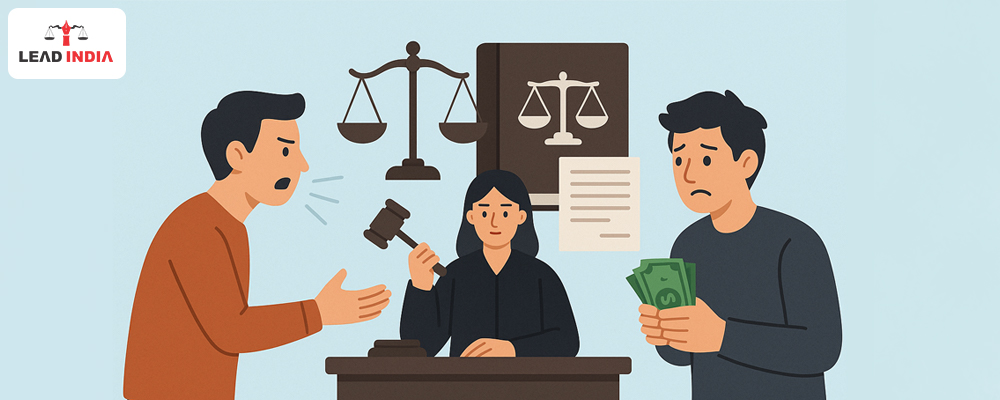We’ve all experienced it, trusting someone with our hard-earned cash, only to find ourselves pursuing them indefinitely when repayment is due. Regardless of whether it’s a friend, relative, coworker, or business partner, conflicts over money can become complicated. However, you do not need to feel powerless. Indian legislation provides various solutions to assist you in recovering your funds lawfully.
In this article, we will walk you through the step-by-step legal measures you can pursue when someone declines to give your money back. Regardless of whether it’s a loan lacking a written contract or a returned cheque, you have alternatives.
Understanding the Situation
- Prior to proceeding with the legal case, there is a need to answer the following questions:
- What was the payment method – cash, bank transfer, or cheque?
- Were contracts, WhatsApp conversations, emails, or any other written documents available?
- Did the borrower issue and later default on a cheque?
- What is the elapsed period since the funds were advanced?
These elements will assist in identifying the most efficient legal route available to you.
Lending money is often an act of trust. But what if that trust is broken and the borrower refuses to pay it back?
You’re not alone.
Many people across India face this problem, and there is a legal way to get your money back without losing your peace of mind or making costly mistakes.
Need A Legal Advice
The internet is not a lawyer and neither are you. Talk to a real lawyer about your legal issue

Step-by-Step: What I Did When My Money Wasn’t Returned
I had once lent ₹1.5 lakhs to a close acquaintance. After six months of delay, excuses, and false promises, I knew I had to act legally. Here’s exactly what I learned (and did) to recover it the right way:
1. File a Civil Suit – The Fastest Legal Route
If you have proof like a signed loan agreement, promissory note, or even chat messages confirming the transaction, you can file a Summary Suit under Order 37 CPC.
Why it worked for me: This method speeds up the court process. The borrower must respond quickly, or the court may pass a judgment without prolonged hearings.
2. Cheque Bounced? Use Section 138 of the NI Act
If you’ve received a bounced cheque from the borrower, you can file a case under Section 138 of the Negotiable Instruments Act.
What I did:
- Send a legal notice within 30 days of the cheque bounce.
- I waited 15 days. No response.
- Filed a case through my lawyer.
Result: The borrower repaid to avoid criminal charges.
3. When It’s More Than Money – File a Criminal Complaint
If you suspect you’ve been cheated deliberately, file a criminal case under:
- Section 316 BNS – For breach of trust
- Section 318 BNS – For cheating
Note: You’ll need to prove the dishonest intent. Legal guidance is a must here.
4. Try Out-of-Court Settlement First (It Works!)
Arbitration or Lok Adalat can be quicker, cheaper, and often more effective. If both parties are willing to talk, this method helps you avoid lengthy court battles.
I tried this initially. While it didn’t work for me due to the other party’s denial, I know others who’ve successfully resolved their disputes this way.
Avoid This Mistake: Don’t Threaten or Harass
One big lesson I learned: No matter how frustrated you are, don’t take matters into your own hands. Threats or public shaming can land you in legal trouble. Stay calm and act through the legal process.
Need Help? Talk to a Money Recovery Lawyer Today
When I hit a wall, I got in touch with a money recovery lawyer who helped me file my case correctly and made the process smooth.
You can also Talk to a Lawyer for Free through Lead India. Their experienced team will assess your case, draft legal notices, and guide you through court procedures to get your money back.
Advice from Legal Professionals
- Don’t spend years anticipating that they’ll give it back. A legal notice not only requests payment—it indicates your seriousness, which frequently results in a swift resolution. Advocate, Delhi High Court
- WhatsApp messages or digital payments through UPI, NEFT, etc. can serve as robust evidence in court, even without a formal written agreement.- Advocate Mumbai High Court:
Conclusion
Yes, being cheated is hurtful. But you can recover your money legally. India’s law is clear if you’ve been wronged, you have the right to seek justice through courts or alternate legal forums.
Financial disagreements can be exhausting, yet you hold some control. Regardless of whether it’s a broken commitment or blatant deceit, Indian legislation offers various legal resources to assist you in recovering your funds. The crucial step is to respond quickly, collect all your evidence, and obtain legal advice if necessary.
Keep in mind: each rupee counts and your peace of mind is important too. Don’t allow another person’s lack of accountability to become your weight to carry. If a person is not giving back your money, you possess both the right and the ability to take action.
One can talk to a lawyer from Lead India for any kind of legal support. In India, free legal advice online can be obtained at Lead India. Along with receiving free legal advice online, one can also ask questions to the experts online free through Lead India.
FAQ’s
1. How can I recover my money legally?
File a civil suit or use Section 138 of the NI Act if you have a bounced cheque.
2. Can I settle without going to court?
Yes, try arbitration or Lok Adalat for quicker resolution.
3. What should I avoid doing?
Don’t threaten or harass the borrower. Stick to legal steps.





 Talk to a Lawyer
Talk to a Lawyer